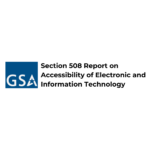The Colorado government recently announced a new policy to ensure digital accessibility standards for citizens with disabilities by 2024. As a result, citizens have access to the same resources and services online, regardless of their abilities or disabilities.
Under this new policy, state agencies must meet certain guidelines when creating or updating websites and other digital content. Firstly, provide text alternatives for non-text content (e.g., images). Next, ensure navigation menus can be accessed via keyboard commands instead of just mouse clicks.
Finally, state agencies will need to provide audio descriptions and captions on videos they post online. This helps people who are deaf or hard of hearing can still understand what’s being said in them.
By implementing these guidelines into their existing practices, the Colorado government is taking a major step towards promoting equality. Something many states have yet to do!
It also serves as an example for other governments across the country who may be looking into similar measures themselves.
What is HB21-1110 Colorado Law for Persons with Disabilities?
HB21-1110 is a new interpretation of Colorado’s existing laws against discrimination toward people with disabilities.
It prohibits excluding an individual with disability from participation or deny benefits of services, programs, or activities of any entity.
The HB 21-1110 Bill defines accessibility as “Perceivable, operable, understandable, and robust digital content. It enables citizens with disabilities to access, engage, and make use of the same interactions offered to other citizens. They are protected with the same privacy, independence, and ease of use as exists for individuals without a disability.”
This Bill sets consistent standards and penalties for non-compliance. The highlights of the legislation include:
- All government agencies must submit their website accessibility plans to the Office of Information Technology by July 1, 2022.
- Websites must implement the accessibility plans by July 1, 2024.
- State agencies that do not comply with the web accessibility standards face penalties including hefty fines and actual monetary damages.
Democratic Rep. David Ortiz of Littleton, elected in 2020, became the first person to serve in the Colorado General Assembly. Ortiz joined hands with disability advocates from the Colorado Cross-Disability Coalition and the National Federation of the Blind to incorporate federal protections for people with disabilities into state law.
Ortiz, who uses a wheelchair, says that the law shows the importance of representation in elected offices.
“When it comes to fighting for disability rights, we have plenty of allies, but it’s different when it’s your community,”
Democratic Representative David Ortiz
Source: Colorado Newline
All Parts of the Colorado Government Must Embrace Digital Accessibility by July 1, 2024
Effective July 1, 2022 onwards, Colorado state agencies must comply with accessibility standards. These are developed by the Office of Information Technology (OIT) by July 1, 2024.
All entities must make digital content “used by the public or government entity employee” accessible per WCAG 2.1 AA guidelines.
Digital content could be websites, applications, kiosks, digital signage, documents, video, audio, third-party tools, text, links, images, forms, PDFs, documents, embedded third-party applications, and more.
Unlike past Colorado legislation on accessibility, these new laws will require accessibility for all disabilities. It has a clear system of enforcement and consequences for inaccessible digital content.
What does this mean for state agencies and their entities?
If state agencies or entities do not comply, they will face a website accessibility lawsuit in a state court.
Consequences of non-compliance
Non-compliance by state agencies and entities to make their digital content accessible results in:
- A court order
- Monetary damages
- A fine of 3,500$, payable to the plaintiff
Colorado’s web accessibility law has spurred other states to take action
Most U.S. states have laws or policies that require state and local agencies to provide accessible websites to their citizens. Generally, states introduce these laws to strengthen Section 508 of the Rehabilitation Act or the Americans with Disabilities Act.
Notable state web accessibility laws include:
- The Illinois Information Technology Accessibility Act requires the State of Illinois to review its accessibility standards once every three years. Currently, the standards require state agencies and universities to comply with WCAG 2.0, while encouraging compliance with WCAG 2.1.
- California Assembly Bill No. 434 requires state agencies and entities to meet WCAG 2.0 minimum Level AA success criteria. The law passed in 2017 and required compliance by July 1, 2019.
- New York State’s Information Technology Policy requires state government agencies, entities, and contractors to conform with WCAG 2.0 Level A and AA guidelines.
However, Colorado’s state web accessibility law is the first to apply to all government web content. This includes local government agencies. The law establishes clear standards and penalties for non-compliance.
About codemantra
codemantra has engaged with various State Agencies to address their website and document compliance requirements.
The company serves on the W3C’s accessibility advisory body and attends the EU’s Web Accessibility Initiative – contributing to the debate ahead of the 2025 EU Disability Act, as part of the EU’s new 10-year disability inclusion strategy. codemantra is SOC 2 compliant and ISO certified for quality management.
We provide a VPAT (The Voluntary Product Accessibility Template) to help buyers planning to purchase the product. Our company offers procurement options through multiple vehicles (CMAS, CA-SLP, NASPO).
Every new client codemantra partners with follows an extensive consultancy and discovery process to establish the optimal engagement process, bringing subject expertise and workflow experience together to establish an effective way forward.
Watch this full explainer video to know more about the products and solutions offered by codemantra!
For more information on digital document accessibility compliance, reach out to us: engage@codemantra.com
Conclusion
The decision by the Colorado Government to enforce digital accessibility standards by 2024 is a significant step towards promoting inclusivity. It ensures everyone has equal access to digital content.
By prioritizing digital accessibility, the government is sending a message that it values and respects the rights of all individuals, regardless of their abilities. This move will undoubtedly have a positive impact on the lives of people with disabilities in Colorado and will hopefully inspire other governments and organizations to follow suit. It is crucial that we continue to prioritize digital accessibility and work towards creating a more inclusive society for all.









